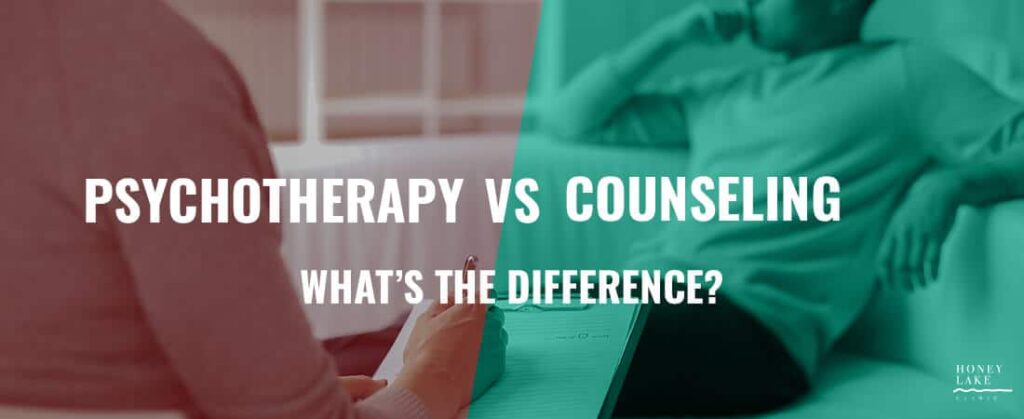Psychotherapy vs. Counseling: What’s the Difference?
The terms Counseling and Psychotherapy are often used interchangeably. Do they mean the same thing? Do they accomplish the same purposes? What are the differences between counseling and psychotherapy?
Most important—Which is best for your needs?
Though there is some overlap between counseling and psychotherapy, there are some very important distinctions which will be helpful to understand when you’re considering a mental health or addiction treatment program or professionals.
What is Counseling?
Counseling is a conversation or series of conversations between a counselor and client. Counseling focuses on specific issues and is designed to help the client address a particular problem, such as addiction or stress management. The focus may be on problem solving or on learning specific techniques for coping with or avoiding problem areas.
In counseling, problems are most often discussed in the present-tense, without too much attention paid to past experiences. Counseling is also often used in shorter-term than therapy.
Counselors typically don’t give as much advice as they guide clients to discovering their own answers and then assist clients in taking steps they choose to take.
What is Psychotherapy?
Psychotherapy is also based on a healing relationship between a health care professional and client. Psychotherapy, also known as therapy and talk-therapy, also takes place over a series of meetings and conversations. Psychotherapy typically takes a longer approach than counseling—some people continue in therapy for months and even years.
Whereas counseling focuses on specific issues and the present tense, psychotherapy considers overall patterns, chronic issues, and recurrent feelings. The underlying principle is that a person’s patterns of thinking and subconscious awareness affect the way they interact with the world. The goal is to uncover those patterns and become aware of their effect and then learn new, healthier ways to think and interact.
This includes exploring the past and its impact on the present. The aim of psychotherapy is to identify and resolve underlying issues to the present situation. Psychotherapists help resolve matters in the past as part of laying the foundation for a more satisfying future.
Types of Psychotherapy
Therapists use several types of talk therapy. The choice of therapy type depends on a client’s particular needs and circumstances. Therapists may combine elements from different approaches to best meet the needs of the person receiving treatment. A few forms of psychotherapy are more well-known and more often applied than others. They include:
Cognitive behavioral therapy (CBT) –useful in helping people identify and change harmful or ineffective thinking and behavior patterns, replacing them with more accurate thoughts and functional behaviors. It can help a person focus on current problems and how to solve them. It often involves practicing new skills in the real world.
Interpersonal therapy (IPT) is a short-term form of treatment. It helps patients understand underlying interpersonal issues that are troublesome, like unresolved grief, changes in social or work roles, conflicts with significant others, and problems relating to others. It can help people learn healthy ways to express emotions and ways to improve communication and how they relate to others. It is most often used to treat depression.
Dialectical behavior therapy (DBT) is a specific type of CBT that helps regulate emotions. It is often used to treat people with chronic suicidal thoughts and people with borderline personality disorder, eating disorders and PTSD. It teaches new skills to help people take personal responsibility to change unhealthy or disruptive behavior. It involves both individual and group therapy.
Additional therapies are sometimes used in combination with psychotherapy. They may include:
- Animal-assisted therapy –working with dogs, horses or other animals to bring comfort, help with communication and help cope with trauma
- Creative arts therapy –use of art, dance, drama, music and poetry therapies
- Supportive therapies –helpful in guiding and encouraging clients in forming their own resources and coping skills
- Play therapy –to help children identify and talk about their emotions and feelings
Counseling or Psychotherapy?
Start by asking yourself a few questions—
- Do you have a single concern or specific issue that you would like to address? Consider counseling.
- Are you generally satisfied with your life and relationships, and just looking for a sounding board? A tune-up in one area or another? Consider counseling.
- Have you noticed a pattern of problems or concerns that seems to keep surfacing in your life? Consider psychotherapy.
- Is it time to address previous trauma or family patterns that are keeping you from health, wholeness and happiness? Robbing you of joy? Consider psychotherapy.
Then talk to someone—
We’d love to offer you guidance as you thinking through options and possibilities. Call us at (888) 837-6577.



